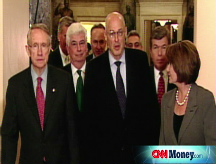Dollar gains as European banks falter
Euro and pound weaken as Wall Street's economic 'contagion' spreads across the Atlantic.
NEW YORK (CNNMoney.com) -- The U.S. dollar rose against other major currencies Monday as turmoil in the European economy undercut the euro and the pound.
The 15-nation currency fell to $1.4468 in New York, down from $1.4615 on Friday.
The British pound was quoted at $1.8160, down from $1.8417. And the Japanese yen fell to ¥104.43 from ¥106.14.
The dollar's strength comes as the crisis on Wall Street appears to be spreading to the European financial system.
In Germany, government regulators and several banks tossed a multibillion euro line of credit to Hypo Real Estate Holding AG in move aimed at preventing the country's second largest commercial property lender from going under.
Meanwhile, the British government announced plans to nationalize troubled mortgage lender Bradford & Bingley, taking over the bank's $91 billion mortgage and loan books, in a bid to help stabalize the country's financial system.
Over the weekend, the governments of Belgium, the Netherlands and Luxembourg partially nationalized Dutch-Belgian banking giant Fortis NV with a $16.4 billion rescue after investor confidence in the bank evaporated last week.
The news from Europe "made the market aware that the contagion was not just in the U.S.," said Amo Sahota, chief currency analyst at U.K.-based HiFX plc.
But the currency market's focus shifted to the United States later Monday after the government's proposed $700 billion intervention in the financial system fell short of the needed votes in the House of Representatives.
"Now all eyes are back on the U.S.," Sahota said.
While the bailout's defeat raises serious questions about the future of the U.S. economy, the dollar did not weaken substantially following news of the vote.
The stock market, however, was hit particularly hard by the bailout delay. The Dow Jones industrial average plummeted 777 points, marking the index's steepest one-day point drop ever.
The gridlock in Washington, "leaves us right where we were before," Sahota said.
"And that is: still confused about whether there's going to be any positive resolution," to the government's plan for combating the crisis on Wall Street.
Lawmakers were widely expected to pass the bailout plan, and Monday's setback caught many market participants by surprise.
"The conventional wisdom was that legislation would be passed by the end of the week," said Stephen Malyon, currency analyst at Scotia Capital in Toronto.
Congress' failure to pass the legislation has prompted some speculation that the Federal Reserve will take steps to prevent further damage to the financial system, Malyon said. ![]()


